PhDs on literary subjects in the post-1830 period
Overview
The Cambridge English Faculty is a major centre for research in 19th- and 20th-century literature. Its staff include several leading figures in Victorian and 20th-century literary studies and it sustains a flourishing research culture. Instead,those students with interests primarily in contemporary critical theory and post-colonial studies should apply to the Faculty's MPhil in Criticism and Culture, and those with interests in American or transatlantic literature should apply to the MPhil in American Literature and those wishing to study 19th and 20th century anglophone literature with particular reference to its intellectual and historical contexts should apply to the MPhil in Modern and Contemporary Literature. We currently admit 10-12 new PhD students in this area each year. We welcome applications from able students who have completed or are completing Master's degrees here or elsewhere.
Programme
Our programme of support is designed to enable Ph.D students (1) to acquire academic skills (2) to get to know a range of Faculty members other than their supervisors (3) to gain a wider sense of their individual subjects and of the relation of those subjects to other research in the period and (4) to develop a research community amongst themelves. As well as meeting regularly with their individual supervisors and with two Faculty-appointed advisers, graduate students working in this period are expected to attend the following:
- throughout the three years
Two fortnightly Graduate Seminars, one focussed on nineteenth-century subjects, the other on twentieth-century subjects. Each offers a varied programme of papers on research in progress from students and from distinguished visiting speakers. These seminars are intended to provide a forum for the kind of collaborative work which usefully supplements and diversifies concentration on the PhD thesis. The seminars meet in alternate weeks, and students working in any part of the period will benefit from attending both.
- in the first year
Issues annd Methods
A series of weekly seminars in the first two terms, designed to enable incoming PhD students to get to know one another and one another's research subjects, and to help them to contextualize their work by providing a forum for informal discussion of texts and issues in the period, and of methods of research. Assistance will be given in preparing for the registration procedure at the end of the first year. A number of senior members of the Faculty working and publishing in this period will participate in these seminars and discuss the issues raised by their research. One main aim of this seminar is to assist graduate students in the period in laying the basis of a research community amongst themselves. The hope is that it will continue to evolve (as it has in past years) into a student-led reading group, meeting informally and continuing into the following term and beyond.
- in the second and third years
The emphasis on developing academic skills and experience continues. Students in their second year will, if possible, be offered the opportunity of doing a small amount of undergraduate teaching on subjects related to their research; and also given the opportunity to gain lecturing experiencew. In addition, there will be communal sessions to discuss problems of completion and presentation, getting work published, and applying for jobs. For example, an academic journal editor will speak about the publication of articles and reviews, and a senior editor from Cambridge University Press about turning a PhD into a book. The University Careers Service has extensive experience of dealing with PhDs, both those considering pursuing an academic career, and those wishing to move on into other kinds of work. It offers (for example) detailed advice on research fellowship, postdoc and lectureship applications, on preparing different kinds of CVs and handling interviews; it provides information on employment opportunities, and maintains a large database of alumni contacts willing to offer help and advice. Students will find this Service invaluable not merely in planning their futures but in helping them to make the most of the time spent in working for the PhD. If you can't find what you need on the Careers Service website, send your enquiries to enquiries@careers.cam.ac.uk.
Faculty Members with research interests in this period
The following Faculty members have active research interests in this period, and would especially welcome graduate students in areas related to theirs.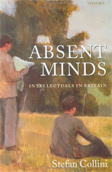 PROFESSOR STEFAN COLLINI,
FBA, (English Faculty) works principally on the relations between literature and intellectual history in the 19th and 20th centuries. He is the author of Liberalism and Sociology (1979), That Noble Science of Politics (1983), Public Moralists (1991), Matthew Arnold: A Critical Portrait (1994), English Pasts (1999), and Absent Minds: Intellectuals in Britain (2006); he has edited works by J.S. Mill, Matthew Arnold, Umberto Eco, and C.P. Snow; and he has published essays on, among other topics, T.S. Eliot, F.R. Leavis, George Orwell, Raymond Williams, cultural criticism, the category of 'non-fiction prose', the idea of the 'non-specialist public', and the historical development of the concept of 'culture'. His research interests include 'Condition-of-England' writing, social criticism, literary journalism, the history of literary criticism, and ideas of culture; he is currently working on ‘Literary criticism and cultural decline in twentieth-century Britain’. NB Professor Collini is on Leverhulme research leave from 2007-2010.
PROFESSOR STEFAN COLLINI,
FBA, (English Faculty) works principally on the relations between literature and intellectual history in the 19th and 20th centuries. He is the author of Liberalism and Sociology (1979), That Noble Science of Politics (1983), Public Moralists (1991), Matthew Arnold: A Critical Portrait (1994), English Pasts (1999), and Absent Minds: Intellectuals in Britain (2006); he has edited works by J.S. Mill, Matthew Arnold, Umberto Eco, and C.P. Snow; and he has published essays on, among other topics, T.S. Eliot, F.R. Leavis, George Orwell, Raymond Williams, cultural criticism, the category of 'non-fiction prose', the idea of the 'non-specialist public', and the historical development of the concept of 'culture'. His research interests include 'Condition-of-England' writing, social criticism, literary journalism, the history of literary criticism, and ideas of culture; he is currently working on ‘Literary criticism and cultural decline in twentieth-century Britain’. NB Professor Collini is on Leverhulme research leave from 2007-2010. |
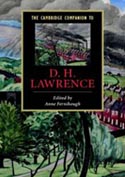 DR ANNE FERNIHOUGH (Girton) works primarily on late-nineteenth and early-twentieth-century literature and culture. Her publications include D.H. Lawrence: Aesthetics and Ideology (1993) and the introductions to the Penguin editions of Lawrence's The Rainbow (1995) and Katherine Mansfield's In a German Pension (1999). She has edited the Cambridge Companion to D.H. Lawrence (2001). She is currently writing a book on British and American writing in the early twentieth century (1900-1914) in a range of cultural and political contexts, with an emphasis on eccentricity and extremism in the period. She is especially interested in socialism, feminism, anarchism and eugenics and their impact on early twentieth-century literature and culture. DR ANNE FERNIHOUGH (Girton) works primarily on late-nineteenth and early-twentieth-century literature and culture. Her publications include D.H. Lawrence: Aesthetics and Ideology (1993) and the introductions to the Penguin editions of Lawrence's The Rainbow (1995) and Katherine Mansfield's In a German Pension (1999). She has edited the Cambridge Companion to D.H. Lawrence (2001). She is currently writing a book on British and American writing in the early twentieth century (1900-1914) in a range of cultural and political contexts, with an emphasis on eccentricity and extremism in the period. She is especially interested in socialism, feminism, anarchism and eugenics and their impact on early twentieth-century literature and culture. |
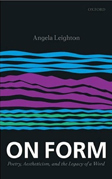 PROF. ANGELA LEIGHTON FBA (Trinity) is Senior Research Fellow at Trinity College. She is primarily interested in poetry of the nineteenth and twentieth centuries, but also in nineteenth-century aestheticism and its continuing legacy in the twentieth, in particular the work of Woolf, Stevens, Bishop, Plath and W.S. Graham. Her books include Shelley and the Sublime, Elizabeth Barrett Browning, Victorian Women Poets: Writing Against the Heart and, most recently, On Form: Poetry, Aestheticism, and the Legacy of a Word (2007). Her first book of poems, A Cold Spell, was published in 2000, and her second, Sea Level, will appear in 2007. |
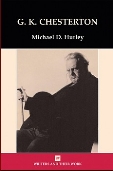
DR MICHAEL HURLEY (St Catharine’s) is interested in the relationship between ‘form’ and ‘meaning’ in literature: on the ways that each provides the context for understanding the other, and especially on the connections between how books and poems make us feel and what they make us think. Specifically, his research emphasises how literary form – literature’s style – may find expression for that which otherwise resists propositional statement or paraphrase. By period and genre, his work is focused largely (though not exclusively) on English poetry and poetics of the nineteenth and twentieth centuries. He is the author of G. K. Chesterton (2012), co-author, with Michael O’Neill, of Poetic Form: an Introduction (CUP, 2012), and editor of the new Penguin Classics edition of The Complete Father Brown Stories (2012). Dr Hurley is currently working on two major projects: A History of Poetics: from Classical Antiquity to the Present (forthcoming with CUP), and a study of Victorian poets’ prosodic repertoires, Victorian Verse Styles. |
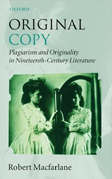 DR ROBERT MACFARLANE (Emmanuel) works principally on British and American literature since 1945, and on the relationships between literature and landscape in the 20th and 21st centuries. His publications include Mountains of the Mind: A History of a Fascination (Granta: 2003), Original Copy: Plagiarism and Originality In Nineteenth-Century Literature (OUP: 2007) and The Wild Places (Granta: 2007). He is currently completing The Old Ways (Penguin: 2012) a book on paths, tracks and footprints, whose subjects include Edward Thomas, the inter-war artist Eric Ravilious and the Scottish modernist Nan Shepherd. His research interests include ecology and eco-criticism, the history and theory of the novel, psycho-geography, travel writing and nature writing. |
![[photo: unknown subject]](images/post1830/mellor.jpg) DR LEO MELLOR (Murray Edwards) works on British writing of the 1920s-40s and contemporary poetry. His current research interest is in Modernism, ruins and the Second World War, specialising in the representation of bombsites in art and literature.. He has written articles on David Jones, Rose Macaulay, David Gascoyne, Colin Simms and Alice Oswald. He is also the convenor of the Cambridge Centenary Symposium, a yearly gathering that examines neglected British authors on the centenary of their birth. In 2007 the writer will be Christopher Caudwell, following on from TH White (2006), Rex Warner (2005), Patrick Hamilton (2004) and Edward Upward (2003). He is also a poet whose published collections include Marsh Fear/Fen Tiger (with Sophie Levy) (2002) and Things Settle (2004); in 2005 he was awarded the Harper-Wood Studentship for English Poetry and Literature to travel among the Welsh speaking communities of Patagonia. |
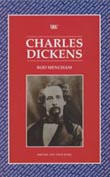 DR ROD
MENGHAM (Jesus) specializes in Victorian and modernist fiction, the 1930s and 1940s, and contemporary poetry and fiction. His publications include The Idiom of the Time: the Writings of Henry Green (1983), ' Wuthering Heights' : a Critical Study (1988), The Descent of Language: Writing in Praise of Babel (1993), Introduction to Contemporary Fiction (1999) and Charles Dickens (2001). He has co-edited with Jana Howlett The Violent Muse (1984), and with Neil Reeve Fiction of the 1940s: Stories of Survival (2001); with Philip Tew he has co-edited Contemporary British Fiction (2003) and British Fiction Today (2006). He has edited fiction by Dickens and E.M.Forster, and is a poet whose most recent book is Unsung: New and Selected Poems (1996; second ed. 2001). He is also the publisher of the Equipage series of poetry pamphlets. He supervises graduate work on 20th century fiction and poetry. DR ROD
MENGHAM (Jesus) specializes in Victorian and modernist fiction, the 1930s and 1940s, and contemporary poetry and fiction. His publications include The Idiom of the Time: the Writings of Henry Green (1983), ' Wuthering Heights' : a Critical Study (1988), The Descent of Language: Writing in Praise of Babel (1993), Introduction to Contemporary Fiction (1999) and Charles Dickens (2001). He has co-edited with Jana Howlett The Violent Muse (1984), and with Neil Reeve Fiction of the 1940s: Stories of Survival (2001); with Philip Tew he has co-edited Contemporary British Fiction (2003) and British Fiction Today (2006). He has edited fiction by Dickens and E.M.Forster, and is a poet whose most recent book is Unsung: New and Selected Poems (1996; second ed. 2001). He is also the publisher of the Equipage series of poetry pamphlets. He supervises graduate work on 20th century fiction and poetry. |
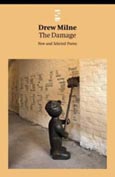 DR
DREW MILNE (Trinity Hall) is the Judith E. Wilson Lecturer in Drama
and Poetry. He works on drama, poetry and critical theory with an
emphasis on modernism and contemporary writing, especially Samuel
Beckett. He is also interested in aspects of Elizabethan and Jacobean
drama, especially Shakespeare in performance. He edited Marxist Literary
Theory: A Reader (Blackwell, 1996) with Terry Eagleton and edits the
journal Parataxis: modernism and modern writing (1991-). He is currently
working on two forthcoming monographs: Reading Marxist Literary Theory
and Performance Criticism. He has published several books of poetry,
including Sheet Mettle (1994), Bench Marks (1998), The Damage (2001)
and Mars Disarmed (2002). For details of all his publications, visit
his homepage at http://drewmilne.tripod.com. DR
DREW MILNE (Trinity Hall) is the Judith E. Wilson Lecturer in Drama
and Poetry. He works on drama, poetry and critical theory with an
emphasis on modernism and contemporary writing, especially Samuel
Beckett. He is also interested in aspects of Elizabethan and Jacobean
drama, especially Shakespeare in performance. He edited Marxist Literary
Theory: A Reader (Blackwell, 1996) with Terry Eagleton and edits the
journal Parataxis: modernism and modern writing (1991-). He is currently
working on two forthcoming monographs: Reading Marxist Literary Theory
and Performance Criticism. He has published several books of poetry,
including Sheet Mettle (1994), Bench Marks (1998), The Damage (2001)
and Mars Disarmed (2002). For details of all his publications, visit
his homepage at http://drewmilne.tripod.com. |
 DR
IAN PATTERSON (Queens') works mainly on British and American Modernism and the modernist tradition in poetry (including contemporary poetry) and fiction. He is also interested in literature and (left-wing) politics, the Spanish Civil War, comparative literature, translation, psychoanalysis, and cultural memory. He has edited and translated Charles Fourier, Theory of the Four Movements (CUP 1996), and is the author of a new translation of Proust's Finding Time Again (Le temps retrouvé) for Penguin. His most recent book is Guernica and Total War (Profile and Harvard University Press, 2007), about bombing and culture in the first half of the twentieth century. He is currently writing an account of Modernist poetry in Britain from 1910 to 1999. His Time to Get Here: Selected Poems was published by Salt in 2003. He has also written on Mary Butts, John Rodker, Wyndham Lewis, J.H.Prynne, marionettes, Freud, translation, and prosody. DR
IAN PATTERSON (Queens') works mainly on British and American Modernism and the modernist tradition in poetry (including contemporary poetry) and fiction. He is also interested in literature and (left-wing) politics, the Spanish Civil War, comparative literature, translation, psychoanalysis, and cultural memory. He has edited and translated Charles Fourier, Theory of the Four Movements (CUP 1996), and is the author of a new translation of Proust's Finding Time Again (Le temps retrouvé) for Penguin. His most recent book is Guernica and Total War (Profile and Harvard University Press, 2007), about bombing and culture in the first half of the twentieth century. He is currently writing an account of Modernist poetry in Britain from 1910 to 1999. His Time to Get Here: Selected Poems was published by Salt in 2003. He has also written on Mary Butts, John Rodker, Wyndham Lewis, J.H.Prynne, marionettes, Freud, translation, and prosody. |
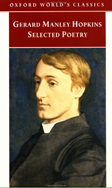 DR
CATHERINE PHILLIPS (Downing) works on relations between literature and nineteenth and early twentieth-century culture. She has written a biography of Robert Bridges (1992), edited the manuscripts of W. B. Yeats' The Hour-Glass (Cornell, 1994) and in 1996 completed the late A. J. Smith's John Donne, vol.ii (Critical Heritage series), covering the revival of Donne's popularity and modern musical settings of his poems. Holder of the International Hopkins Society Award, her contributions to the subject include the Oxford Authors Hopkins (1986), Gerard Manley Hopkins: the Major Works (2002), Selected Poems (Oxford Poets, 1995, World Classics, 1996), Selected Letters (1990) and a number of invited lectures. She is a member of the editorial advisory board of the Hopkins Quarterly and English Studies, and book review editor of Hopkins Quarterly. At present she is co-editing a complete edition of Hopkins’ letters with R. K. R. Thornton and writing about Victorian art and literature with particular reference to Hopkins. DR
CATHERINE PHILLIPS (Downing) works on relations between literature and nineteenth and early twentieth-century culture. She has written a biography of Robert Bridges (1992), edited the manuscripts of W. B. Yeats' The Hour-Glass (Cornell, 1994) and in 1996 completed the late A. J. Smith's John Donne, vol.ii (Critical Heritage series), covering the revival of Donne's popularity and modern musical settings of his poems. Holder of the International Hopkins Society Award, her contributions to the subject include the Oxford Authors Hopkins (1986), Gerard Manley Hopkins: the Major Works (2002), Selected Poems (Oxford Poets, 1995, World Classics, 1996), Selected Letters (1990) and a number of invited lectures. She is a member of the editorial advisory board of the Hopkins Quarterly and English Studies, and book review editor of Hopkins Quarterly. At present she is co-editing a complete edition of Hopkins’ letters with R. K. R. Thornton and writing about Victorian art and literature with particular reference to Hopkins. |
 PROFESSOR
ADRIAN POOLE (Trinity) has interests in comparative drama, especially the practice and theory of tragedy, and in nineteenth-century and twentieth-century literature, particularly fiction. He supervises graduate students on authors and topics in the period from 1800 onwards. His books include Gissing in Context (1975), Tragedy: Shakespeare and the Greek Example (1987), and Henry James (1991). He has written on Homer, Euripides, Shakespeare, Dickens, George Eliot, Hardy and Kipling, and edited novels by Dickens, James and Stevenson. With Jeremy Maule, he edited The Oxford Book of Classical Verse in Translation. His current research projects include books on Shakespeare and the Victorians and on witnessing Tragedy. PROFESSOR
ADRIAN POOLE (Trinity) has interests in comparative drama, especially the practice and theory of tragedy, and in nineteenth-century and twentieth-century literature, particularly fiction. He supervises graduate students on authors and topics in the period from 1800 onwards. His books include Gissing in Context (1975), Tragedy: Shakespeare and the Greek Example (1987), and Henry James (1991). He has written on Homer, Euripides, Shakespeare, Dickens, George Eliot, Hardy and Kipling, and edited novels by Dickens, James and Stevenson. With Jeremy Maule, he edited The Oxford Book of Classical Verse in Translation. His current research projects include books on Shakespeare and the Victorians and on witnessing Tragedy. |
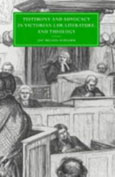 DR
JAN-MELISSA SCHRAMM
(Trinity Hall) works primarily on the relationship between literary and legal discourse in the Victorian period. She is a Barrister and Solicitor of the Supreme Court of Tasmania and the High Court of Australia. She practised as a lawyer in Australia before undertaking her PhD here in Cambridge on the ways in which the emergence of the laws of evidence and the advent of full legal representation for those accused of serious crime shaped narrative form in the early nineteenth century. She is particularly interested in the fiction of Fielding, Godwin, Dickens, Eliot, Thackeray and Dostoevsky. She is the author of Testimony and Advocacy in Victorian Law, Literature and Theology (Cambridge University Press, 2000) and her current research projects include a book-length study on changes in the conception of character evidence and identity in the course of the nineteenth century. DR
JAN-MELISSA SCHRAMM
(Trinity Hall) works primarily on the relationship between literary and legal discourse in the Victorian period. She is a Barrister and Solicitor of the Supreme Court of Tasmania and the High Court of Australia. She practised as a lawyer in Australia before undertaking her PhD here in Cambridge on the ways in which the emergence of the laws of evidence and the advent of full legal representation for those accused of serious crime shaped narrative form in the early nineteenth century. She is particularly interested in the fiction of Fielding, Godwin, Dickens, Eliot, Thackeray and Dostoevsky. She is the author of Testimony and Advocacy in Victorian Law, Literature and Theology (Cambridge University Press, 2000) and her current research projects include a book-length study on changes in the conception of character evidence and identity in the course of the nineteenth century. |
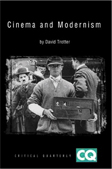 PROFESSOR
DAVID TROTTER
(Caius) has written extensively about nineteenth- and early twentieth-century British and American literature and its contexts. His publications include The Making of the Reader: Language and Subjectivity in Modern American, English, and Irish Poetry (1984), Criculation: Defoe, Dickens and the Economies of the Novel (1988), The English Novel in History 1895-1920 (1994), Cooking with Mud: the Idea of Mess in Nineteenth-Century Art and Fiction (2000), Paranoid Modernism (2001), and Cinema and Modernism (2007). Current research interests include the representation of ordinariness in Victorian fiction; the development and consequences of Naturalism as a literary movement and way of thinking; the function of description in literature and cinema; and the ‘social logic’ of space in Hollywood cinema from 1908 to the present day. PROFESSOR
DAVID TROTTER
(Caius) has written extensively about nineteenth- and early twentieth-century British and American literature and its contexts. His publications include The Making of the Reader: Language and Subjectivity in Modern American, English, and Irish Poetry (1984), Criculation: Defoe, Dickens and the Economies of the Novel (1988), The English Novel in History 1895-1920 (1994), Cooking with Mud: the Idea of Mess in Nineteenth-Century Art and Fiction (2000), Paranoid Modernism (2001), and Cinema and Modernism (2007). Current research interests include the representation of ordinariness in Victorian fiction; the development and consequences of Naturalism as a literary movement and way of thinking; the function of description in literature and cinema; and the ‘social logic’ of space in Hollywood cinema from 1908 to the present day. |
|

